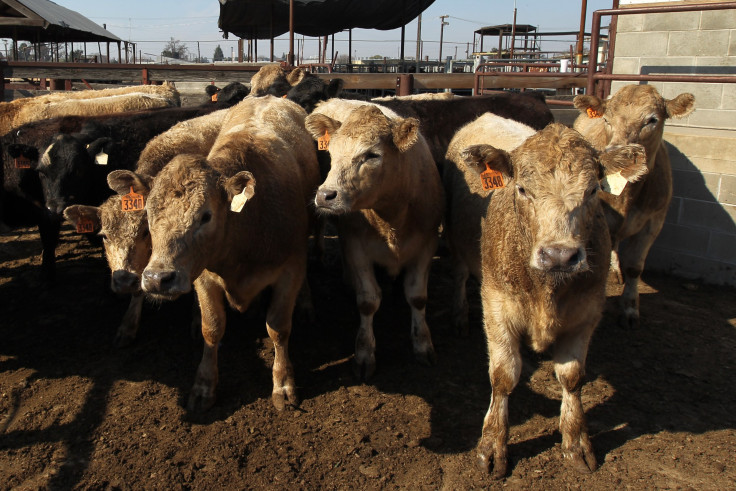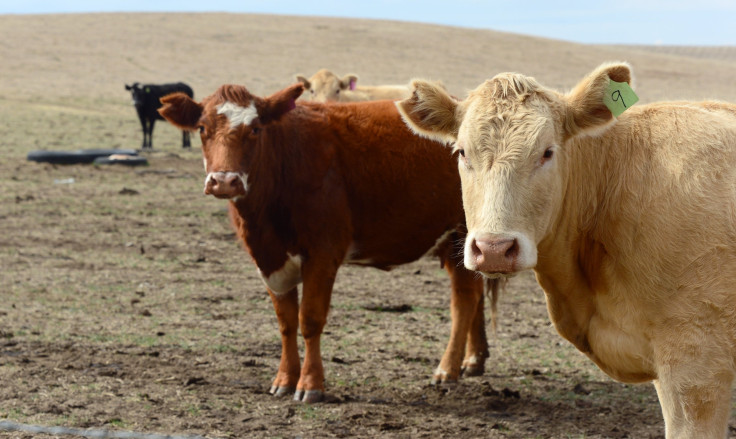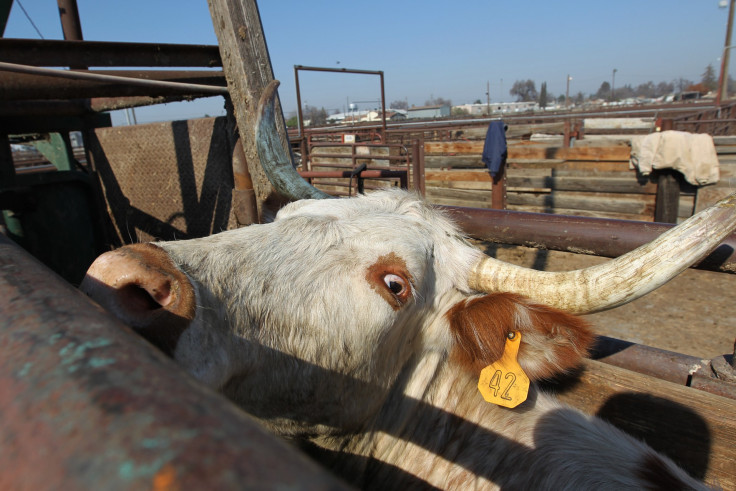California Antibiotic Livestock Law: Landmark Legislation Is Strictest In The U.S., Could Catch On With Other States

With a swipe of his pen, California Gov. Jerry Brown signed a landmark piece of legislation Saturday that will restrict farmers and ranchers from giving healthy farm animals routine, low doses of antibiotics beginning January 2018. Antibiotics have often been administered to livestock to speed up growth and for disease prevention, but they've also long been controversial.
Every year roughly 2 million Americans get sick, and 23,000 die, from antibiotic-resistant infections, which scientists said can be linked to the use of antibiotics in livestock. The sweeping ban is the first of its kind, and with California being one of the top producers of livestock in the nation, it will likely have a ripple effect on other states, potentially changing the landscape of the livestock industry, experts said.
"This law goes well beyond what the FDA has put out so far," said Avinash Kar, a senior attorney for the Environment and Health Program at the Natural Resources Defense Council. "California is a major agricultural state, so I think it’s consequential in that regard. We hope other states will follow with their own laws."

The bill, drafted by Democratic Sen. Jerry Hill, bans the use of any medically important antibiotics for promoting growth in livestock used for profit. Many livestock producers engage in subtherapeutic antibiotic use, which is a low daily dosage of antibiotics that can be used to promote growth. Veterinarians will still be allowed to prescribe medically important antibiotics to meat producers if an animal is sick, or to prevent infections in an "elevated risk." The FDA defines "medically important antimicrobial drugs" as those that are important for therapeutic use in humans.
The bill also states that the drugs cannot be administered in a "regular pattern." While the Food and Drug Administration has taken strides toward phasing out the use of antibiotics in livestock -- it encourages drug companies to voluntarily end sales of medically important antibiotics for growth promotion and will soon require companies to change their labeling -- the new bill is a much tighter restriction and will make a significant difference, according to Kar.
"The FDA left the loophole for disease prevention, and that was one of the main things that needed to be addressed," he said. "The new bill will prohibit the regular use of antibiotics for disease prevention. Farmers still have many non-antibiotic options to preventing disease, including cleaning more frequently, providing more space for the animal."
Growth promotion occurs when livestock producers administer low daily or routine doses of antibiotics to their animals, which ultimately can lead to reduced feed costs. Despite this cost reduction, a ban on antibiotics will likely not have a huge economic impact, according to experts in the industry.
"The majority of our product's supply and demand is influenced by financial markets, what's going on overseas … those are the sorts of things that go into the price of live cattle and beef." Justin Oldfield, vice president of government relations at the California Cattlemen’s Association, said.
Kar also cited a study concluding that a ban would have little economic effect.
"From our perspective, the economic impact is likely to be low or none. In Denmark and the Netherlands, they eliminated the use of antibiotics for growth promotion and disease prevention, and have seen little economic impact. In the U.S., we have seen all these chicken producers who are committing to eliminating antibiotics, including Perdue, Tyson and Foster Farms."

While economic woes are not likely, Oldfield acknowledged that some other challenges could arise in making sure veterinarians keep up with medicine approval and availability. "As an association, we encourage all of our farmers to have a relationship with veterinarians," he said. "We want to make sure they don’t lose access to these drugs in a timely fashion. We will be working with current retailers to make sure these products are available."
Farmers are concerned about antibiotic resistance in their own farm animals, Oldfield added, just like humans are concerned with antibiotic resistance in their own bodies. "I care about antibiotic resistance like everyone else does," he said. "We want to control disease in animals; that impacts us as well."
The legislation has strong potential for going nationwide, and other states, including Maryland, Minnesota, New Jersey, New York, North Carolina, Pennsylvania and West Virginia, are considering similar laws that aim to curb on-farm antibiotic use. The move toward tighter antibiotic regulations comes at a time when consumers are increasingly clamoring for foods from fast-service restaurants like Chipotle and Panera Bread, which limit or prohibit the amount of antibiotics used in production of the meats they serve. A recent report, however, found 20 of the nation's 25 largest fast-food and fast-casual restaurants received an F for their antibiotics policies and sourcing practices. Tighter antibiotic regulations could transform how many fast-service restaurants operate.
McDonald's investors push to go completely antibiotic free: http://t.co/g7B73PAI6e pic.twitter.com/HWfi6xuMDv
— The Hill (@thehill) September 17, 2015
"I think that the changing consumer landscape is an important one. We are seeing significant changes as the end result as you’re seeing announcements from companies like Chick-Fil-A and McDonald's," Kar said. "Consumer interest in this issue is driving interest in the industry."
© Copyright IBTimes 2024. All rights reserved.












